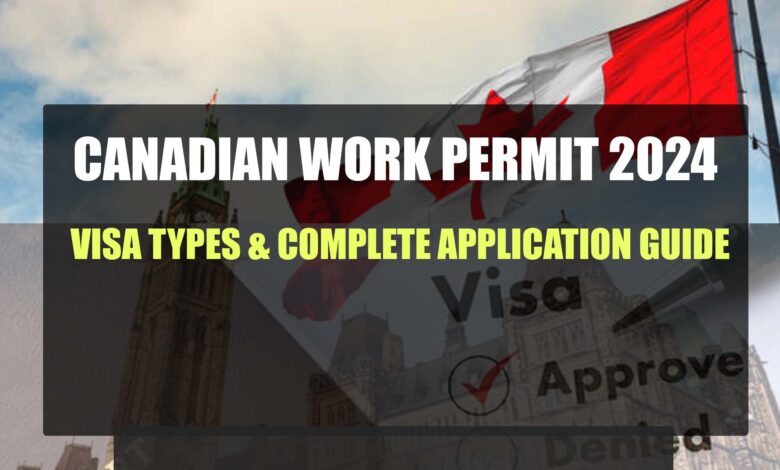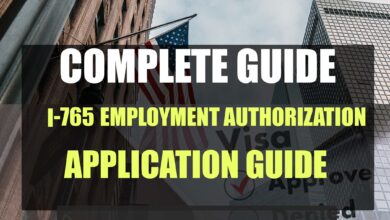Canadian Work Permit 2024: Visa Types & Complete Application Guide

Canadian Work Permit 2024: Visa Types & Complete Application Guide
To lawfully work in Canada after finding a job and receiving an employment contract or offer, you must obtain a Canada Work Permit. You must apply for a Canadian Work Permit even if you land a job in the private or public sectors of the economy. For those who wish to enter Canada to work, there is an additional option; in this post, we will go over all of these different types of work visas for Canada.
One of the first nations to allow immigration and work permits was Canada. Canada has promoted skilled individuals to relocate to boost the economy since 2024. Due to its excellent prospects for professional and personal growth, the nation is known as one of the best places to migrate. Canada is the place to be if you want more money and a higher standard of living.
For all professionals who aspire to work elsewhere, Canada is home. This nation’s status as one of the most sought-after travel destinations in the world stems from its legitimate work permits and range of work visas, as well as its easy-to-use employment search system and accommodating immigration laws.
Canada, which has the eighth-largest economy in the world, helps immigrants become permanent citizens by providing them with a range of services, including legal work permits.
People prefer to work in Canada for a variety of other reasons besides the prospect of greater income and career progress. Notably, the youth unemployment rate in the nation is lower than that of other nations. The nation offers its workers paid time off, excellent medical facilities, and holiday leave that includes parental and maternal leave.
The government is constantly updating its IT infrastructure to offer the best starting point for individuals interested in pursuing careers in information systems or computer programming. Numerous opportunities exist in sectors like engineering, building, healthcare, pharmaceuticals, telecommunications, aviation, and aerospace.
Benefits of Canadian Work Permit
- Legal Work Authorization: To ensure conformity with Canadian immigration requirements, a work permit provides legal authority to work in Canada for a certain employer for a predetermined period.
- Access to the Canadian Job Market: Individuals with work permits can apply for positions in many Canadian industries, which helps them further their careers and advance their careers.
- Possibility for Skill Development: Those who work in Canada have the opportunity to pick up new skills, hone their current ones, and receive training that will advance their careers.
- Generating Income: While residing in Canada, individuals with work visas can support their families and themselves through employment.
- International Work Experience: Work experience gained in Canada enhances a resume and gives it a global perspective, which improves employability both within and outside of Canada.
- Networking and Professional Connections: Working in Canada enables people to establish meaningful relationships, expand their professional networks, and possibly pave the way for future employment prospects both domestically and abroad.
- Prospective Route to Permanent Residency: A few work permits could act as a springboard for obtaining permanent residence in Canada, giving individuals the chance to establish long-term roots and a stable life there.
- Access to Social Services and Benefits: Canadians with work permits may be qualified for several social services and benefits, including healthcare and education for dependent children.
- Participation in the Canadian Labor Market: Through the Temporary Foreign Worker Program (TFWP) and other work permit streams, employers in Canada regularly hire competent workers, providing opportunities for foreign talent to contribute to the Canadian labor market.
- Cultural Integration and Exchange: Working in Canada enables individuals to integrate into Canadian society, gain knowledge of its customs, and add to the country’s rich diversity.
- Boosting the Canadian Economy: By working and paying taxes in Canada, people with work permits contribute to the country’s economic growth and development.
Canadian Work Visa or Work Permit
To enter and reside in Canada to work, one must have a work permit. Although you normally need authorization, there are a few situations where you might not require a work offer or a permit. Canada is a popular destination for immigrants, with over 500,000 arriving there annually.
Seeking employment before deciding to relocate permanently is a smart place to start if you’re considering moving to Canada in search of better living conditions.
Types of Work Permits for Canada
There are more than a hundred distinct types of work permits in Canada. The nation runs the Temporary Foreign Worker Program (TFWP) and the International Mobility Program (IMP). Unlike the other two programs, the TFWP needs the “Labor Market Impact Assessment” (LMIA), a labor market test.
Employers can prove to the Canadian government—through the LMIA—that hiring a migrant worker won’t negatively affect the nation’s current labor force. The many kinds of work permits that are available are as follows:
1. Work Permit Via Labor Market Impact Assessment
Temporary Foreign Worker Program (TFWP)
Through the Temporary Foreign Worker Program (TFWP), recruiters in Canada can temporarily hire foreign workers to address skill shortages. Under the TFWP, employers are permitted to hire foreign academics, foreign agricultural laborers, foreign in-home caregivers, foreign high-wage workers, and foreign low-wage workers.
Facilitated LMIA (Quebec)
The migration programs in Quebec are usually managed differently from those in other provinces because the province has more latitude in its immigration policy. Hiring international employees is made easier in Quebec via the streamlined LMIA process.
Global Talent Stream
One section of Canada’s Temporary Foreign Worker Program is called the Global Talent Stream. According to some Canadian recruiters, the GTS aims to make it as easy as possible for people to apply for a work permit so that they may continue to compete internationally.
2. No LMIA, but Requires a Job Offer/Contract
International Mobility Program (IMP)
Through the International Mobility Program (IMP), employers in Canada can hire temporary foreign workers without the need to perform a Labor Market Impact Assessment (LMIA). There are requirements attached to these LMIA waivers, such as the need for migration to add value to the country.
NAFTA Work Permits
Specialists do not need to submit an LMIA to apply for a work permit in Canada, thanks to the NAFTA Professionals provision. A job offer from a Canadian company and expertise in a field included in the NAFTA Professionals List of Occupations are prerequisites for eligibility under this policy.
Work Permits under CETA
EU nationals have exceptional work chances in Canada thanks to CETA. Per CETA standards, foreign nationals may be permitted to work in Canada without requiring a labor test or a work permit.
Intra-business Transfers
The rules governing the temporary employment of highly qualified foreign nationals in Canada as intra-business transferees are outlined in the country’s International Mobility Program. An international employee of a multinational corporation may be able to migrate to one of the company’s Canadian businesses with the use of an LMIA-exempt work visa. Intra-company transferee permission is necessary for all countries.
3. Open Work Permits: Requires No Employment Contract or Labor Test
Post-Graduation Work Permits (PGWP)
A type of work permit that enables foreign students to obtain a visa after completing an academic program in Canada. Holders of PGWPs are free to work for whomever, anywhere, and for as many hours as they choose. The duration of this kind of license ranges from eight months to three years.
Spousal Sponsorship from Canada
You can be qualified for an open work permit if your spouse sponsors your permanent residence in Canada, works or attends school there already, or both.
International Experience Canada (IEC)
Young people from participating nations may come to Canada for a limited period to travel, live, and work under the International Experience Canada (IEC) program. International participants in IEC programs can apply for a work permit in Canada without taking a labor exam. The 12-month IEC visa is frequently referred to as a working holiday visa.
Bridging Open Work Permit (BOWP)
Foreign nationals may carry on working under the BOWP while pursuing permanent residency applications.
Spouse Accompanying International Student or Worker
If a foreign citizen who is married and has children wishes to pursue education in Canada but is unable to part from them, they are permitted to do so.
Conclusion
A work permit from Canada provides access to a wealth of social, personal, and professional benefits. It makes it possible for people to work legally in Canada, opening doors to a range of career opportunities, skill advancement, and overseas work experience. This power not only fosters individual financial success but also strengthens Canada’s economy and broadens its cultural base.
A Canadian work visa is also, for many, the first step toward accomplishing long-term goals, such as possible routes to permanent residency. Generally speaking, getting a work visa for Canada is an invitation to join Canada’s vibrant and welcoming society, which fosters both career success and a fulfilling personal life.
Frequently Asked Questions
What is the name of the work permit for Canada?
A work visa is usually required for foreign nationals looking for temporary employment in Canada. Two of the main initiatives that provide work permits are the International Mobility Program (IMP) and the Temporary Foreign Worker Program (TFWP).
Does Canada require the IELTS for a work permit?
To demonstrate your proficiency in the English language, you must pass a language exam before being hired in Canada. The IELTS General Training exam may be sufficient to meet Immigration, Refugees, and Citizenship Canada (IRCC) requirements, whether you’re applying for a work visa, professional registration, or permanent residency in Canada.
What is the duration of a work permit in Canada?
Usually, work permits are good for one or two years. On the other hand, a Canadian visa officer has the authority to change a work permit’s validity duration based on whether the employee’s travel document or visa has expired.
Read On
New Rules for Working Hours for International Students in Canada
Canada Unveils New Work Permit Program in 2024 | Canada Work Permit
Australia 4 Years Work Visa in 2024: Complete Guide
Canada Open Work Permit 2024: Easy Access to Working in Canada
Belgium Working Holiday Visa: Complete Application Process
Steps to Obtain a 5-Year Work Visa for Finland in 2024: Complete Guide
Italian Work Visa Process 2024: Complete Guide & Application Process
US EB3 Work Visa 2024: Complete Guide & Application Process
Kuwait Unveils New Work Permit System in 2024: Full Details
Japan Working Visa 2024: Visa Types, Requirements & Application Process
Ireland Work Visa 2024: Visa Eligibility & Application Process
Hungary Work Visa 2024: Visa Types, Eligibility Criteria & Application Process
Belgium Seasonal Work Permit 2024: Complete Application Process
France Work Visa 2024: Visa Types, Eligibility & Application Process
US Work Visa 2024: Visa Types, Eligibility Criteria & Application Process
UK Seasonal Worker Visa 2024: Complete Guide & Application Process
Saudi Arabia Work Visa 2024: Visa Types, Eligibility & Application Process
Decreto Flussi Work Permits in Italy for International Students 2024: Complete Guide
Scotland Work Visa 2024: Visa Types, Eligibility, and Application Process



